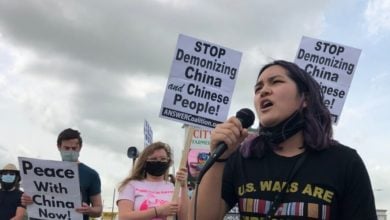Many hundreds of thousands of people have taken to the streets of Seoul to demand the resignation of South Korean President Park Geun-hye due to charges of corruption. Protests have gone on for five Saturdays straight. Organizers estimated over 1.2 million protesters were in the streets on Nov. 26, despite snow and cold winter temperatures.
While there are numerous reasons why the people of South Korea are angry with Ms. Park, the corruption charges facing her along with a long-time friend and several aides seem to be the straw that broke the camel’s back. Her friend, Choi Soon-sil, has been charged with fraud, coercion and abuse of power. Prosecutors allege that Ms. Choi used her personal relationship with President Park to pressure corporations into donating millions to her foundations in order to prevent political reprisals to their businesses, with the money in turn used to fund her expensive lifestyle. Samsung, Hyundai, LG, SK and Lotte have all been summoned or had their corporate offices searched by prosecutors.
A former presidential aide was arrested for assisting Ms. Choi in this extortion. A second aide was arrested for leaking at least 180 confidential documents, including defense secrets, to Ms. Choi, who has never held public office and has no security clearance. President Park continues to be under investigation for her role as an accomplice in her friends’ misdeeds. (She cannot be charged while in office due to constitutional immunity, which she would immediately lose if she were to leave office.)
Park apologized for her “shortcomings,” replaced 10 of her senior secretaries, and appointed a new prime minister. Despite these moves, her approval ratings have plummeted to around 5 percent. One poll showed that 80 percent of South Koreans favor impeachment.
After a three-week seclusion from the public, Park Guen-hye announced Nov. 29 that she would be willing to let the National Assembly decide when she should step down. Prior to this announcement, it appeared that assembly members were about to impeach her.
Why are South Koreans angry?
South Korean politics has long been plagued by allegations of corruption and influence-peddling between corporations and powerful families. And the Korean people are fed up.
While students study hard to get into good schools, Choi Soon-sil’s daughter earned entry into the prestigious Ewha Women’s University despite poor grades and barely attending class. (The university is now under investigation.) Jun Dae-joo was a former ambassador to Vietnam when the South Korean Consulate asked local authorities to help the high-end kindergarten run by Choi’s nephew and Jun’s friend, Chang Seung-ho. As the allegations mounted, President Park Guen-hye was discovered to be receiving free anti-aging treatments from a private clinic while her friend Choi Soon-sil was illegally acquiring injections for Park’s treatment.
These treatments have raised new questions about what Ms. Park was doing during the “missing seven hours.” This refers to the time between when the president was notified of the sinking Sewol ferry and when she finally called an emergency meeting. During those hours, 304 of the 476 passengers, mostly high school students, drowned. In her 5:15 p.m. meeting, her words left the public suspicious that she wasn’t even aware of the deaths. Questions have arisen whether she was unconscious or undergoing cosmetic surgery during the time these youths were dying, but the government has refused to answer, claiming reasons of “national security.” (The ship has yet to be removed from the water, and there has been no full investigation into the cause of the tragic sinking or closure for the families.)
Park Geun-hye is the daughter of the military dictator Park Chung-hee, who was installed by the CIA in 1961 and ruled until his assassination in 1979. She has not directly followed his path, which saw the torture and murder of thousands under his rule, but she and her Saenuri Party have been involved in suing journalists and jailing labor leaders and opposition politicians.
In December 2014, the Unified Progressive Party was disbanded by the Ministry of Justice under the claim that it was “taking orders” from Pyongyang—capital of the Democratic People’s Republic of Korea. This was the first time the government had banned a political party since 1958. To the anger of many students, Park’s Ministry of Education has replaced the history textbooks for middle and high schools with a single state-written text to give students “correct historical views and values” that minimize criticism of former dictators and imperialist collaborators.
Why is the U.S. worried?
The U.S. ruling class is not worried about Korea due to the corruption, back-room deals or repression of the people. Their concern is with shaky alliances and changing power dynamics in Asia—the basis for another set of grievances against President Park.
The wounds left by Japanese imperialism on the Korean people are still festering. There are Korean women still alive who were taken by the Japanese military in World War II to be used as “comfort women” for the soldiers. Worries exist that military agreements could lead to Japanese troops stationed in South Korea once again.
Ms. Park made two agreements with Japan in the last year that have left many Koreans angry. The first, nearly a year ago, with Japanese Prime Minister Shinzo Abe on the issue of the comfort women was declared “final and irreversible.” It called for Japan to donate a measly one billion yen ($9 million) to a South Korean foundation providing services for former comfort women, and to issue an apology for the pain experienced by these women while deflecting any real admission of responsibility.
Surviving comfort women have rejected assistance from the foundation saying they want the Japanese government to take responsibility for its role in war crimes and provide real reparations. Youth have been out defending a statue of a young Korean girl as a memorial for comfort women that continues to stand in front of the Japanese embassy in Seoul despite demands for its removal.
On Nov. 23, despite plummeting political support, President Park successfully rushed through a military intelligence agreement with Japan that had been dropped by the previous administration due to great public opposition, which continues. Under this “General Security of Military Information Agreement,” South Korea and Japan can trade military intelligence directly instead of going through the United States. The focus of the agreement is exclusively to collaborate against the DPRK—for now at least. This move is seen as taking advantage of the distraction of the corruption scandals rocking the government to push through an unpopular deal.
Millions of South Koreans see these two agreements—comfort women and military intelligence—by the Park government as betrayals of the country, while reconciliation issues between S. Korea and Japan have yet to be seriously dealt with.
Protests against THAAD
On top of all the above, there have been protests against the installation of THAAD missiles (“Terminal High-Altitude Area Defense”) 120 miles south of Seoul. These missile systems are intended to intimidate the DPRK and are perceived to be a threat against China and Russia as well. Residents have expressed concern over the potential health effects of the missile systems and damage to agriculture. They are angry that neither the public nor the National Assembly were consulted about the project. Once installed, these missiles could make South Korea and its people a target in any regional or global conflagration.
The people of South Korea have made their voices heard. They want the corruption, incompetence, and shady deals to end. They are resisting any escalation of the decades-long U.S. occupation or potential stationing of Japanese troops in the country. They along with the people of a number of other countries in the region are raising demands that could deal a solid blow to imperialist strategy.
U.S. imperialism out of Asia!





